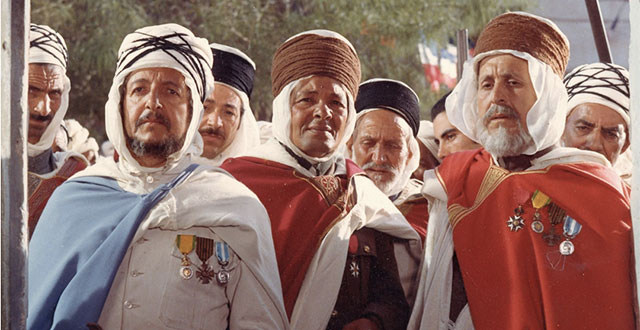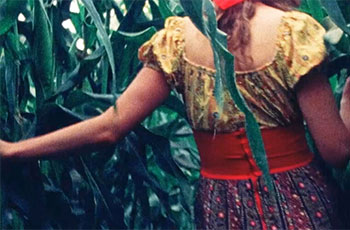
NOTES ON FILM & RESTORATION
02/25/2021The cinema is widely and commonly recognized as a popular art form, but its presence and the breadth of its history in different areas of the world varies wildly. The art form itself is often identified with this country, because ours has been the most spectacular, the most widely exported, and perhaps the most sheerly dynamic in relation to the development of the century: as André Bazin once observed, American society has told itself its own developing story and mythology through its cinema. But the cinemas of Great Britain, France, Italy, Germany, Russia, China and Japan have been forceful presences in the history of the art form for just as long, and Indian cinema has been a powerhouse. In other parts of the world, production has been fitful, in Africa most of all. Africa is a big continent and there are obviously exceptions, including Egypt and, to a lesser extent, South Africa. But in general, getting a film made in Africa has long been, and continues to be, difficult. With the exception of the quickly and massively produced titles shot on home video equipment that started coming out of Nigeria in the late 80s, African cinema is basically one film at a time, each one financed and produced under unique circumstances. The preservation of African cinema has been especially problematic for just those reasons.
The African Film Heritage Project was launched in 2017, a closely coordinated effort between The Film Foundation, the Cineteca di Bologna—where the effort is spearheaded by the formidable Cecilia Cenciarelli—UNESCO (whose “General History of Africa” project is now in its 7th decade and in preparation with its 9th, 10th and 11th volumes) and FEPACI (Pan African Federation of Filmmakers), which launched a crucial survey of all African film archives. The aim of the AFHP is to locate the elements (mainly in European archives) and then restore and preserve African titles selected by a group of African filmmakers and scholars in coordination with FEPACI. Thus far, AFHP has restored Med Hondo’s Soleil O, which was completed not long before the filmmaker’s death; Mohammed Lakhdar-Hamina’s Chronicle of the Years of Fire from Algeria, which won the Palme d’Or at Cannes in 1975; Timité Bassori’s 1969 film La Femme au couteau from the Ivory Coast; Jean-Pierre Dikongué Pipa’s Muna Moto from Cameroon; and Djibril Diop Mambéty’s Contras’ City from Senegal. Pre-dating the formation of AFHP, the World Cinema Project arm of The Film Foundation restored Trances and Alyam Alyam by Ahmed Al-Maanouni from Morocco (I focused on Trances a ways back here); Mambéty’s Touki Bouki and Ousmane Sembene’s Borom Sarret and Black Girl, three foundational films from Senegal; and Shadi Abdel-Salam’s Al Momia also known as The Night of Counting the Years, and The Eloquent Peasant, from Egypt. The scope of all these linked initiatives and the dedication behind them is deeply moving, a titanic collective effort to reclaim history on multiple fronts. The majority of these films are revelatory on many levels—for westerners with limited exposure or even knowledge of the fact of Africa’s multiple cinemas, and for African audiences and film students as well. For Aboubakar Sanogo, FEPACI’s North American secretary, this is a crucial element. “The young African filmmakers are at a really important crossroad,” he told Mark Cosgrove. “There has never been more of a passion for making films than now in terms of sheer numbers…What they don’t have access to is the history.” The ultimate goal is that “no African filmmaker can take a camera without seeing a Med Hondo or Sembène or Cissé.” It’s a noble goal for Africa and its cinemas, and a real example to millions living on wealthier continents throughout the world who harbor the sadly mistaken belief that history can be either ignored or discarded or re-molded like a lump of clay. Which always ends in humiliation, disgrace, or tragedy.
- Kent Jones
Follow us on Instagram, and Twitter!
SOLEIL O (1970, d. Med Hondo)
Restored by Cineteca di Bologna at L'Immagine Ritrovata laboratory in collaboration with Med Hondo. Restoration funded by the Hobson/Lucas Family Foundation and The Film Foundation's World Cinema Project.
This restoration is part of the African Film Heritage Project, an initiative created by The Film Foundation’s World Cinema Project, the Pan African Federation of Filmmakers and UNESCO – in collaboration with Cineteca di Bologna – to help locate, restore, and disseminate African cinema.
CHRONICLE OF THE YEARS OF FIRE (1975, d. Mohammed Lakhdar–Hamina)
Restored by The Film Foundation’s World Cinema Project and Cineteca di Bologna at L’Image Retrouvée and L’Immagine Ritrovata laboratories. Restoration funded by the Hobson/Lucas Family Foundation.
This restoration is part of the African Film Heritage Project, an initiative created by The Film Foundation’s World Cinema Project, the Pan African Federation of Filmmakers and UNESCO – in collaboration with Cineteca di Bologna – to help locate, restore, and disseminate African cinema.
LA FEMME AU COUTEAU (1969, d. Timité Bassori)
Restored by Cineteca di Bologna/L’Immagine Ritrovata and The Film Foundation’s World Cinema Project. Restoration funded by the Hobson/Lucas Family Foundation.
This restoration is part of the African Film Heritage Project, an initiative created by The Film Foundation’s World Cinema Project, the Pan African Federation of Filmmakers and UNESCO – in collaboration with Cineteca di Bologna – to help locate, restore, and disseminate African cinema.
MUNA MOTO (1975, d. Jean-Pierre Dikongué-Pipa)
Restored by Cineteca di Bologna/L’Immagine Ritrovata and The Film Foundation’s World Cinema Project. Funding provided by the Hobson/Lucas Family Foundation.
This restoration is part of the African Film Heritage Project, an initiative created by The Film Foundation’s World Cinema Project, the Pan African Federation of Filmmakers and UNESCO – in collaboration with Cineteca di Bologna – to help locate, restore, and disseminate African cinema.
CONTRAS’ CITY (1968, d. Djibril Diop Mambéty)
Restored in 2020 by Cineteca di Bologna/L'Immagine Ritrovata and The Film Foundation's World Cinema Project in association with The Criterion Collection. Funding provided by the Hobson/Lucas Family Foundation.
This restoration is part of the African Film Heritage Project, an initiative created by The Film Foundation’s World Cinema Project, the Pan African Federation of Filmmakers and UNESCO – in collaboration with Cineteca di Bologna – to help locate, restore, and disseminate African cinema.
TRANCES (1981, d. Ahmed Al-Maanouni)
Restored in 2007 by Cineteca di Bologna/L’Immagine Ritrovata laboratory, in association with The Film Foundation’s World Cinema Project, Ahmed El-Maanouni, and Izza Genini. Restoration funded by Armani, Cartier, Qatar Airways and Qatar Museum Authority.
ALYAM ALYAM (1978, d. Ahmed Al-Maanouni)
Restored by Cineteca di Bologna/L’Immagine Ritrovata laboratory, in association with Ahmed El-Maanouni. Restoration funded by The Film Foundation’s World Cinema Project.
TOUKI BOUKI (1973, d. Djibril Diop Mambéty)
Restored in 2008 by Cineteca di Bologna/L’Immagine Ritrovata laboratory, in association with The Film Foundation’s World Cinema Project and the family of Djibril Diop Mambéty. Restoration funded by Armani, Cartier, Qatar Airways and Qatar Museum Authority.
BOROM SARRET (1963, d. Ousmane Sembène)
Restored in 2013 by Cineteca di Bologna/L’Immagine Ritrovata laboratory and Laboratoires Éclair, in association with The Film Foundation’s World Cinema Project, the Institut National de l’Audiovisuel, and the Sembène Estate. Restoration funded by Doha Film Institute.
BLACK GIRL (1966, d. Ousmane Sembène)
Restored by Cineteca di Bologna/ L’Immagine Ritrovata laboratory, in association with the Sembène Estate, Institut National de l’Audiovisuel, INA, Eclair laboratories and the Centre National de Cinématographie. Restoration funded by The Film Foundation’s World Cinema Project.
AL MOMIA (1969, d. Shadi Abdel-Salam)
Restored in 2009 by Cineteca di Bologna/L’Immagine Ritrovata laboratory, in association with The Film Foundation’s World Cinema Project, and the Egyptian Film Center. Restoration funded by Armani, Cartier, Qatar Airways, Qatar Museum Authority and the Egyptian Ministry of Culture.
THE ELOQUENT PEASANT (1969, d. Shadi Abdel-Salam)
Restored in 2010 by Cineteca di Bologna/L’Immagine Ritrovata laboratory, in association with The Film Foundation’s World Cinema Project, and the Egyptian Film Center. Restoration funded by Armani, Cartier, Qatar Airways and Qatar Museum Authority.
